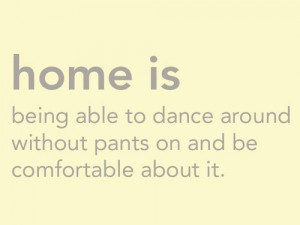Figuring out this place called home
Which would you say is the correct answer?
Why not both!?
The problematic nature of home can be introduced quite thought provokingly in this quote by Chamberlin:
“Home is caught up in the contradictions between reality and the imagination, here and elsewhere, history and hope.” (Chamberlin, 74)
Chamberlin’s quote highlights the few distinguishing qualities of home that point to the complexity of trying to define the word home. Home represents the compromise between reality and imagination. The home we miss and remember exists only in our memories and imagination. Those emotions are especially strong when you feel far from it (we miss the thoughts and feelings that come with the idea of home). Although home has such an abstract definition in the physical world, certain elements of home make it very real. For example, the land we stand and build our houses on are very quantifiable things. In addition, as humans, we form deep emotional responses to places that offer us success in protection and reproduction. It can be argued that those feelings of longing are not just “imagined” or simply “stories”, but are cognitive adaptations we developed. The mixture of these two powerful elements make “home” a very fluid and flexible concept.
Chamberlin futher illustrates why it is problematic to figure out this place we call home:
“The sad fact is, the history of settlement around the world is the history of displacing other people from their lands, of discounting their livelihoods and destroying their languages …
Put differently, the history of many of the world’s conflicts is a history of dismissing a different belief or different behaviour as unbelief or misbehaviour and of discrediting those who believe or behave differently as infidels or savages.” (78)
The conflict depicted by Chamberlin struck me as a problem of cultural relativism and cultural superiority. The European settlers viewed the indigenous as less advanced and pressed their culture onto them. For the natives, their voices became increasingly drowned out and what the natives once saw as home were now dictated by the Europeans. Our difficulty in figuring out Canada as a home is due to the past conflicts caused by imperialist attitudes. The founding of Canada silenced many voices and stories, and we have only just started to acknowledge, listen and appreciate them. How can we call Canada our home when we don’t listen to both sides of the story?
References:
“This is Home”. Digital Image. http://www.thisishomeproject.blogspot.ca/ Web. 23rd. May 2014.
Paterson, Erika. Lesson 1.2. ENGL 470A Canadian Studies: Canadian Literary Genres. University of British Columbia, 2014. https://blogs.ubc.ca/engl47098amay2014/unit-1/lesson-12/ Web. 23rd May. 2014.
Chamberlin, J. Edward. If This Is Your Land, Where Are Your Stories?: Finding Common Ground. Toronto: A.A. Knopf Canada, 2003. Print.
Buss, D. M. (2011). Evolutionary psychology: The new science of mind. Fourth Edition. Allyn & Bacon.


“Home is being able to dance around without pants on and be comfortable about it”. Haha best definition ever! Seeing how you mentioned that you were born in Vancouver, raised in Hong Kong, and now back to Vancouver for school- what does home mean to you? Kind of going on a tangent here, but I’ve always wonder about whether people who relocate to Vancouver to attend UBC ever feel that Vancouver becomes “home” to them.
🙂
I enjoyed reading your blog and I would agree with your very last point on “how can we call Canada our home when we don’t listen to both sides of the story”. This is Chamberlin’s overall tone of the importance of stories and how we are connected by them. I also like how you note the complexity of the word ‘home’ and by referring back to ‘story’, in this place called ‘home’ it surely allows us to deconstruct and analyze colonial history. For me home is a place where not only can we live for the present and the future, but this place we all home has memories which will always remain. Referring to Chamberlin’s quote “Home is caught up in the contradictions between reality and the imagination, here and elsewhere, history and hope.” (Chamberlin, 74) We can really see the fluidity of the word ‘home’ and how we need to recognize what is reality and what is imagination- and when we can start educating ourselves and realizing the true stories of ‘home’ only then can we be faced with reality.
I enjoyed reading your blog.
Bobby,
🙂
Hi Leo – thank you. Just one little note of big importance. Notice this sentence:
“The European settlers viewed the indigenous as less advanced and pressed their culture onto them. For the natives, their voices became increasingly drowned out and what the natives once saw as home were now dictated by the Europeans.”
This sentence is a reflection of the oppressive power of grammar that we practice without noticing, indeed; grammar is a powerful tool of colonization and in turn colonizing narratives. Can you see how the grammar in the sentence above is oppressive? I am going to borrow your sentence to make this point on our FaceBook page for everyone to consider.
Thank you for a thoughtful and well expressed blog 🙂
Hi there!! Loved your blog post, and the image at the beginning made me laugh. You effectively demonstrate your point, and it was an interesting read. I agree with Bobby and yourself regarding the dilemma of calling Canada home when we don’t quite know exactly what home is. Thanks for the thought provoking post!